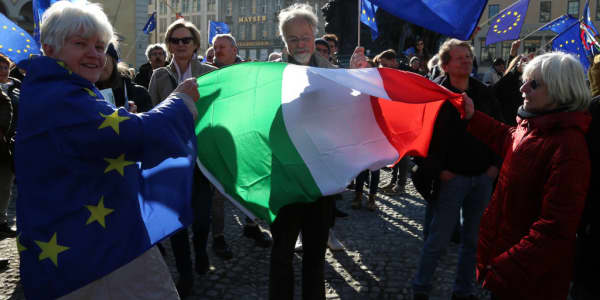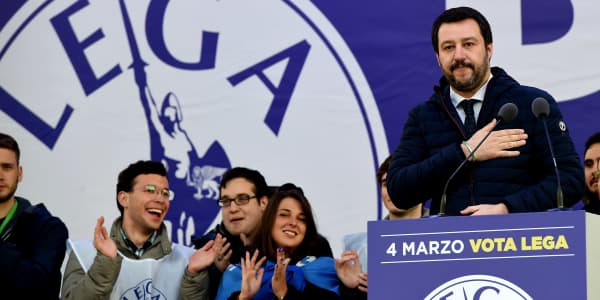Market watchers and foreign politicians are carefully watching developments in Italy, where voters will elect a new prime minister and parliament on March 4.
The outcome of the vote could spark jitters among Europe in the face of rising support for populism at a time when the Italian economy is at a critical juncture.
Polls suggest that the election won't result in a majority government and political parties will have to form an alliance in order to govern.
Here are the main contenders in the Italian election and their coalition partners.
Matteo Renzi
The leader of the center-left Democratic Party, and former prime minister, is seeking to return to power. He resigned from government back in 2016 after voters rejected his changes to the constitution. Since then, the left-leaning government has been led by caretaker Prime Minister Paolo Gentiloni.
He could potentially decide to form a coalition government with the pro-European party Piu' Europa (More Europe).
Emma Bonino
She's the head of the liberal party Piu' Europa and former minister of foreign affairs.
After more than 40 years in politics, Emma Bonino is one of the most famous female politicians in Italy.
Luigi di Maio
The youngest of all contenders, Luigi di Maio heads the populist and anti-establishment Five Star Movement (M5S) founded by comedian Beppe Grillo.
Maio has softened the party's stance on the euro but still demands agreements with Europe to reform fiscal policies.
His party has not entered any coalition but he told CNBC that he would be willing to negotiate with other parties if the vote doesn't give a clear majority to any of the parties.
Silvio Berlusconi
Silvio Berlusconi has been prime minister of Italy three times. Despite a series of sex scandals and tax fraud convictions, the 81-year-old media mogul is once again at the center stage of Italian politics and could have a pivotal role in the upcoming general election.
He cannot become prime minister after being banned from holding public office for six years for tax fraud, although he is appealing the ruling. But as leader of Forza Italia, polls suggest that he could get more votes than Renzi and potentially more than the Five Star Movement too.
His party has joined forces with three other parties - the Northern League, Brothers of Italy and Us with Italy - increasing his chances of winning a majority.
Giorgia Meloni
Meloni is the leader of Brothers of Italy — a right-wing and euroskeptic party. She was minister of youth during one of Berlusconi's governments.
She's running in the aforementioned four-party, right-wing coalition.
Matteo Salvini
The Italian politician has been a member of the European Parliament since 2004 and leader of the Northern League since December 2013.
Lega Nord is also a populist and euroskeptic party, also running with Berlusconi's party.





